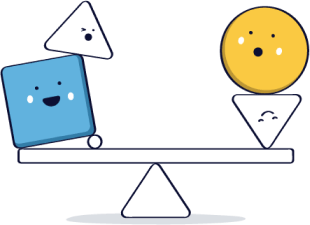
Interested in becoming a salesperson but don’t know how to get a sales job?
Anyone can learn the skills they need to be successful in sales, provided you start with the right foundation.
Knowing some tips for beginning your sales career, the most essential sales skills, and the job that will get you where you want to go can help you put your best foot forward.
Ready to dive into the job market so you can start your sales career? Here are some tips to keep in mind to help you ace your sales job interviews, stand out from the crowd, and land a sales job with ease.
In sales, it’s important to be able to tap into many techniques and skills to turn opportunities into closed deals. The best salespeople have built a solid foundation of tactics, and continue to constantly learn and find ways to improve their sales skills.
Whatever your experience with sales, start working on your knowledge and skills to prepare for whatever new role comes your way.
Here are a few places to start when building up your sales knowledge:
Use your imagination and think outside the box in presenting yourself in the best way possible.
Spend some time getting to know yourself so you can talk about your skills with a potential employer.
If you have sales experience, outline your top successes and the lessons you learned from your failures. You’ll also need to demonstrate your soft skills, like listening, and communication, and how they’ve made you a great salesperson.
If you don’t have much sales experience, develop a way to leverage your past experiences in a way that transfers into sales. For example, if you worked in retail and frequently suggested products to customers, you likely developed a skill for understanding a buyer’s needs and matching them with the products that best suit them.
It’s easier to become an expert and conquer a subject if you are passionate about it. It’s better to focus your talent and energy on mastering what you are good at than trying to accomplish everything. Then mold what you’re interested in with your own personality.
Use your interests and experiences to determine what industry or field you try to enter. For example, f you’ve worked as a nurse, medical device sales might be a great path for you. If you’re currently in IT, you might find success selling software. Find the place where your passions and skills meet, and you’ll be well on your way to becoming an effective salesperson!
As you prepare to break into a new sales career, get some practice selling yourself and your abilities. This will prepare you for the interview process and set you up as the best solution for your prospective manager.
If you’re currently working outside of sales, look for a problem in your workplace and find a solution, then “sell” the solution to your manager. It’ll be great practice for selling to a customer and help you use your sales skills in a real scenario.
Develop a personal brand that authentically tells your story and positions you as an expert, despite your lack of sales experience. Sell your experiences and brand to your interviewer to prove that even though you may need some training, you have the soft skills and unique competencies to be a top performer.
If a full-time sales job is tough to find, don’t give up. Your goal is to find a position where you can develop the important skills for your sales career. Try searching for part-time jobs or jobs involving interactions with customers, like customer service.
As you’ve learned from the pros, expertise takes time. Learn from experiences and challenges. Stick with it, and you’ll become an expert over time.
The Sell to Win Playbook collects 55 of the best expert sales tips we’ve ever published. Download it today!

If you’re looking to get a job in sales, what skills should you start building? Here’s an overview of the top six skills needed in sales.
It stands to reason, but written and verbal communication are some of the most essential sales skills. You need to be able to convey your meaning efficiently and clearly, whether you’re sending an email, leaving a voicemail, or chatting with a prospect over Zoom.
Successful salespeople can also effectively communicate how their product or service solves problems—and not just any problems, but the problems of the specific lead they’re speaking to, whether a business or individual customer.
Great salespeople don’t just know how to talk—they also know how to listen. And listening doesn’t just involve understanding the words that came out of another person’s mouth. Engaged listening is the ability to read between the lines and see into the other person’s needs, desires, fears, and goals.
Whether you’re a newbie or a pro, you need to know what you’re selling—inside and out. If you’re getting a job selling products or services you’re already familiar with, you’re one step ahead. But if you’re entering an entirely new field, you need to develop your learning skills.
You need the ability to succinctly explain a product’s features and benefits, but also look at it from a potential customer’s point of view to see how it could make their life easier. Be ready to do some homework so you can confidently pitch your product.
In sales, there are often lots of demands on your time, from preparing a product demo to writing emails and following up with leads. Time management is an essential skill that will help you make the most of your workday.
It’s important to be on time for phone calls and meetings, respond to emails promptly, and manage all of your appointments while also juggling smaller tasks and communication.
While a lot of work as a salesperson involves one-on-one conversations, you’ll likely spend a good deal of time pitching to a larger group of people. Public speaking is a highly valuable skill that prepares you for these kinds of scenarios.
Good salespeople know how to command attention, speak concisely, and get out of the way of their message. Throwing in some well-placed humor never hurts either.
You may view confidence as a personality trait, but it’s actually a skill you can develop. Some people are naturally more confident and calm in public speaking scenarios than others, but you can absolutely work on your confidence as you prepare to get a job in sales.
Find the best sales motivational quotes, podcasts, and positive role models to follow that can increase your confidence.
You’ve learned some tips and have a game plan for developing more sales skills—but where should you start your sales career?
Picking the right place to start your sales career can be difficult. There are commission-based and salary-based positions, inside sales and outside sales jobs, and innumerable B2B and B2C industries to specialize in. Which role will teach you what you need to know—and fast?
We spoke with a variety of sales professionals to see what they had to say about each of these sales career options. As it turns out, there’s no one-size-fits-all solution. The right place for you will depend upon what skills you already have and what you’re ready to improve on.
In a commission-based sales position, all or part of your income depends upon your ability to make a successful sale. On the one hand, this means that there’s theoretically no limit to how much you can earn. But if you’re in a 100% commission-based position, meaning you have no base salary, there’s no guaranteed minimum you can earn, either.
Interestingly, the sales professionals who recommended commission-based positions were passionate about owning their own businesses. They preferred commission-based positions for their flexibility, limitless opportunities, and because these positions quickly teach newbies how to swim—or sink.
Nomad Veronica Founder Veronica Hanson’s first job was an hourly sales position in retail, which made her feel like her efforts weren’t fairly compensated. She moved on to a 100% commission-based job to learn more and increase her income.
“A full commission structure will teach you how your efforts are directly correlated to your income,” Veronica says. “Above all else, these sales positions help people level up their lifestyles and skills.”
Veronica’s experience with commission-based positions gave her the know-how and confidence to launch her own business, which now generates passive income and allows her to be location-independent.
Before you jump on the commission-based bandwagon, you should know that most sales professionals we spoke to favored positions with a salary or at least some base pay for rookies. Without a strong understanding of fundamental sales techniques, commission-based positions can stress out inexperienced salespeople and make them feel desperate.
“High-pressure sales…although a motivator for some, can create situations of desperation that ruin your sales technique,” says Dwayne Vera, a sales trainer and consultant who has managed sales teams for Fortune 500 companies. “Much like desperation to reach a certain number of reps in weight-lifting can cause you to have improper form and lead to injuries, the desperation to make a sale can cause you to have an improper technique and injure your credibility or your ability to sell properly.”
In the end, your decision to start in a position with commissions or with guaranteed pay will depend upon your existing strengths and weaknesses. If you thrive in a high-pressure environment and have some natural selling ability, you might grow more quickly in a commission-based position.
If you’re unsure or want to refine your techniques before adding a challenging variable in an already challenging field, start in a position that has a financial safety net.
By now you hopefully have an idea of what pay structure you’re best suited to start in, but what about the actual sales environment? Again, whether you want to work in a retail location, in the field, in a call center, or on a small team depends upon your learning style and existing strengths.
Outside sales include retail, working in the field, or any other situation that primarily involves face-to-face conversations. These kinds of positions are a good place to start for people who like dynamic interactions and want some training before leveling up to more high-pressure situations.
Corey McCarthy, an Account Executive with BizLibrary, felt that his time in retail helped him learn the basics of communicating with strangers. It gave him a solid foundation before moving on to a more fast-paced environment like a call center.
“Retail and outside sales really make you think on your feet and react quickly to the customer’s needs,” says McCarthy. “There were always curveballs coming your way with difficult situations, but I feel that really helped me understand a lot about sales and uncover some great soft skills.”
Outside sales also give you more opportunities to become an expert about what you’re selling, especially if you’re handling a physical product. You can watch how customers interact with it, see what they like best, then leverage that information to sell to future customers.
Related: 19 Ways to Nail Your Next Sales Presentation
“I have found that speaking with customers face-to-face is the single best way to learn and grow,” said Albert Ho, who got his start selling CPAP machines to people with sleep apnea, and now educates other healthcare sales professionals through his consulting business. “One can observe how customers need your product, and the features and benefits that customers want.”
Those observations served him well: Within one year he had over 400 customers, and within two years he’d made $1 million in sales.
Inside sales is the most common sales model for B2B, SaaS, tech, and B2C companies that have higher ticket products. These kinds of sales are typically handled remotely via phone or email. Inside sales reps may find themselves working in a call center, with a sales team, or even from their own home.
Mack Dudayev, Co-Founder of Chance Realty, LLC, thinks that call centers can be good places to start for people who are already comfortable talking to strangers and want to desensitize themselves to rejection.
“This environment will facilitate your development of a thicker skin considering your rejection rate is much higher at a call center versus those who hold in-person positions,” Mack says.
He also believes that working in a call center will equip a new salesperson with more skills and faster than in an outside sales position. It makes sense given that you’ll always be in the company of more experienced peers.
“The fact that you’re constantly surrounded by other sales representatives provides you with valuable hands-on experience, mentorship, and the ability to witness various styles of sale.”
However, there are pitfalls to working in a call center, too. It’s important not to rely too heavily on a script and become complacent.
Patrick Rafferty is the Director of Business Development for Online Optimism, a digital marketing company based out of New Orleans. He believes that performing the same cold call speech without any modifications is a recipe for disaster.
Instead, truly successful inside sales reps require a level of authenticity that can only be honed, not rehearsed. He says:
“If you work in an environment that provides you with real, honest conversations with a potential client, you’ll learn how to create a sound strategy for them instead of pushing a product and becoming the stereotypical salesperson.”
You have to train for sales like you would train for a marathon, it’s a muscle that needs to be worked, every day, without fail. The more calls you make, the more no’s you get, the more emails you send, the stronger that muscle gets. And for training purposes, there are few industries more grueling and competitive than financial services. If you want to work your sales muscle, sell mortgages or insurance. And if you get good it at, your paycheck can grow pretty fast.
Michael Carroll, Head of Growth at Nutshell
Another way to avoid the trap of becoming a stereotypical salesperson is to join an industry you care about from the very start.
Albert Ho, the CPAP salesman who went on to train other healthcare sales professionals, firmly believes that you should follow your interests when choosing a field to specialize in.
“If you’re not passionate about cars, don’t work at an auto dealership,” he says. “I’m passionate about healthcare, so I went into nursing and then into medical device sales.”
When you genuinely believe in the value of what you’re selling, it’s easier to have authentic conversations with potential customers. You also won’t get sick of thinking about the product all the time, and the occasional workplace doldrums will be easier to push through.
Whether you decide to start in a call center or in retail, in a commission-based position, or a position with base pay, almost all of the sales professionals we spoke to stressed the importance of starting your sales career with a company that values your growth.
“If you are going to invest your time in an organization, make sure they invest some time and training in you,” says Corey McCarthy, the Account Executive with BizLibrary.
Ideally, this means going through a structured, immersive training program, as well as having access to experienced mentors.
“For a beginner to be good in sales, it is crucial to be guided and trained by another great salesman,” says Shawn Lim, a Sales Manager with M&P International Freights. “Having a mentor around lets you discover your weaknesses and strengths so you can improve your sales skills at a fast rate.”
Related: Who was your sales mentor, and what was their greatest lesson?
Want more information about getting a sales job? These FAQs might give you the answers you’re looking for.
With the right skills and an eager and sincere approach, anyone can succeed in sales. Develop a go-getter attitude, be willing to go the extra mile and stay hungry for new knowledge and skills. With a little patience and persistence, you’ll soon find a sales job that fits you.
If you have little to no sales experience, realize that you’ll have a lot to learn—and prepare to bring your best to every interaction, whether that means learning sales techniques in your free time or pursuing mentorship so you can level up your skills. You’ll need to dive in with a growth mindset, owning your past experiences and transferable skills while being eager to learn new approaches.
An entry-level sales job is a great place for beginners to get hands-on experience navigating sales scenarios. Entry-level sales jobs range from working in retail sales to call centers. The key is knowing which skills you already have and which could use some work, so you can apply to positions that will help you grow.
The path to getting a sales job ultimately depends on your existing strengths, weaknesses, goals, and interests. Be honest about what your needs are before you choose
The customer relationship management platform (CRM) you use as a salesperson can make a big impact on how you track leads, organize your week, and manage communication. Nutshell CRM has all the features you need to automate email outreach, track leads through your pipeline, manage customer data, and collaborate with the rest of your team. For salespeople who want to save time and sell more, Nutshell is a no-brainer.
Try Nutshell free for 14 days!
Nutshell has what you’re looking for.

Join 30,000+ other sales and marketing professionals. Subscribe to our Sell to Win newsletter!
 Email & Calendar Sync
Email & Calendar Sync
Use our calculator to add up your total investment of CRM and Add-ons
VIEW ALL PRICING
 Product Info
Product Info Education & Guides
Education & Guides Company
Company